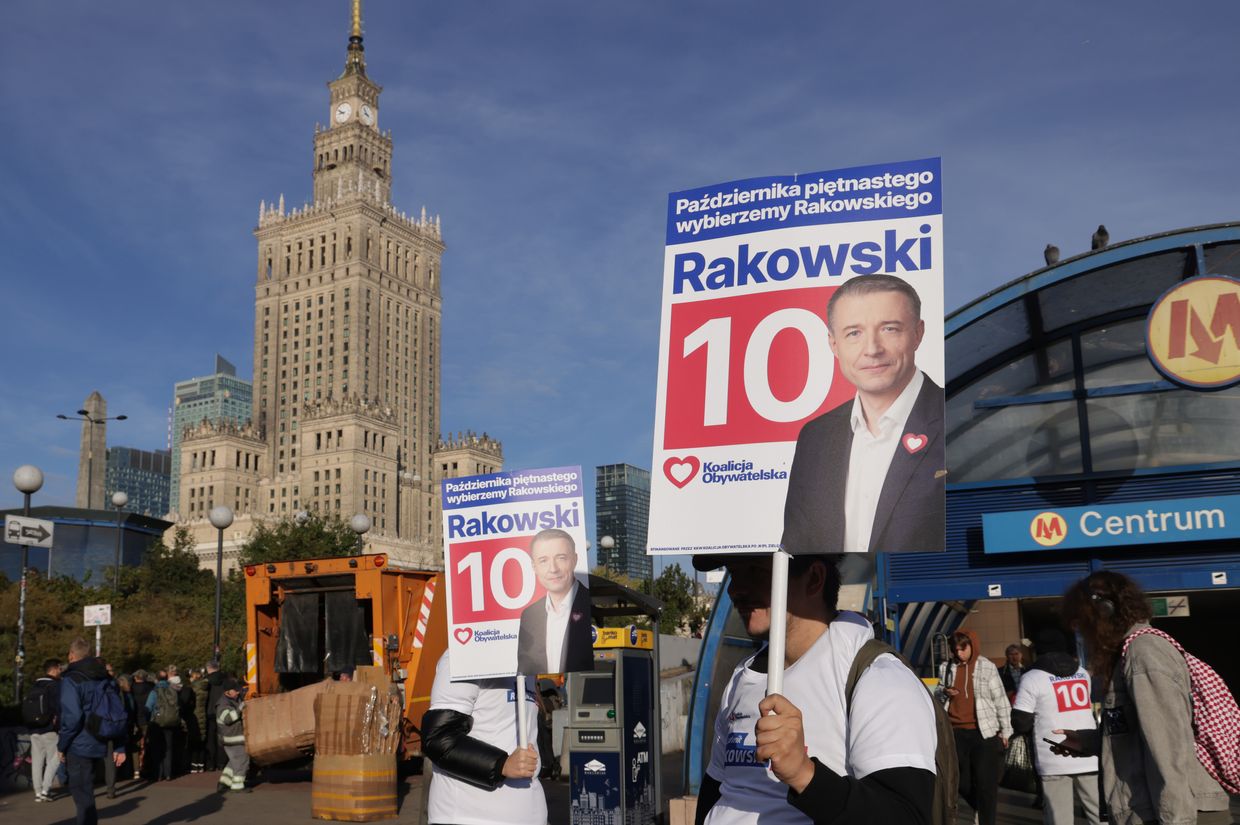Voters in Poland will cast ballots on Oct. 15 in a high-stakes parliamentary election that may return the ruling conservative Law and Justice (PiS) party to power for a third-straight term, following months of acrimonious campaigning that saw Warsaw's support for Ukraine emerge as one key point of contention.
All 460 seats are up for grabs in Poland's lower parliamentary chamber, the Sejm, where Law and Justice and its allies now command a slim majority, and the 100 spots in the Senate, which is controlled by the opposition by a similarly thin margin.
The Law and Justice government won plaudits for its outspoken pro-Kyiv stance following Russia's full-scale invasion, but critics have long accused it of weakening democracy in Poland itself.
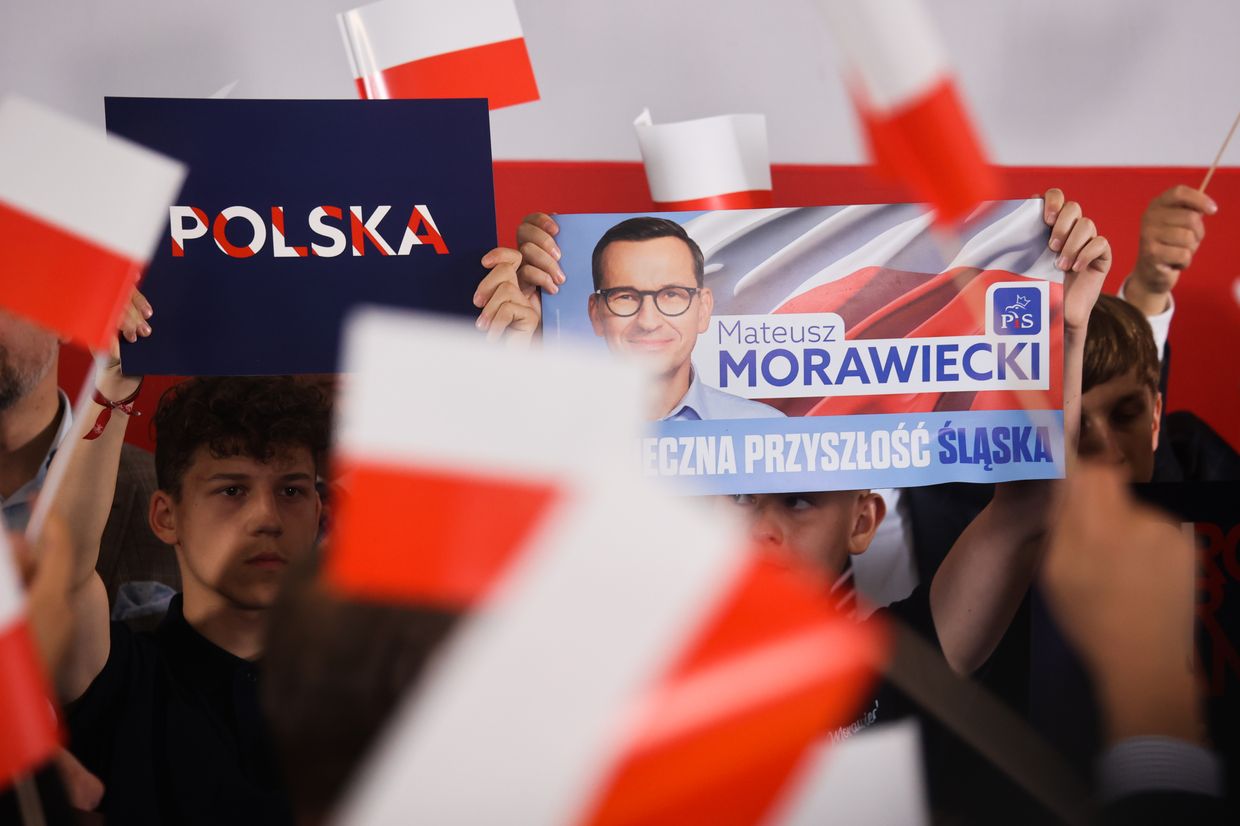
Cracks also appeared to be deepening between Warsaw and Kyiv in recent months, with a dispute over Ukrainian agricultural imports and the presence in Poland of hundreds of thousands of Ukrainian refugees referenced in increasingly harsh campaign statements by government figures.
The opposition claims that Law and Justice has degraded the rule of law and fair electoral competition in the country throughout its nearly eight-year rule.
As an example, the opposition cites the government's decision to call a controversial "national referendum" on the same day as the election.
Voters will be asked whether they favor "accepting thousands of illegal immigrants" and "selling off state enterprises," among other moves Law and Justice implies would be high on the liberal opposition's agenda.
Government critics charge that the referendum concerns hypothetical policies that no party pushes and is consequently little more than an attempt by Law and Justice to whip up support.
Law and Justice politicians retort that opposition leaders calling for boycotting the vote are "anti-democratic."
The bitter row over the referendum is just one of many over the course of a campaign rife with personal attacks and unsubstantiated claims.
State-controlled media have loudly echoed the Law and Justice's campaign message that a key opposition leader, the former EU Council President Donald Tusk, has Berlin rather than Warsaw's best interests at heart while stirring up older Poles' World War II trauma and painting the EU as an instrument of German power.
Analysts say that Poland's relations with both Ukraine and Brussels risk becoming a casualty of domestic political struggles, with Law and Justice sharpening its rhetoric as it fears losing votes to a hard-right rival.
Meanwhile, all parties grapple with the questions of how to offer a fair deal to Polish farmers, maintain the country's defense capabilities, and keep social spending in check while respecting the rights of Ukrainian migrants and continuing to counter what most across the political spectrum see as an enduring Russian threat.
Here are the main forces contending for seats in the Polish parliament, along with their stances on Ukraine, Russia, and the EU.
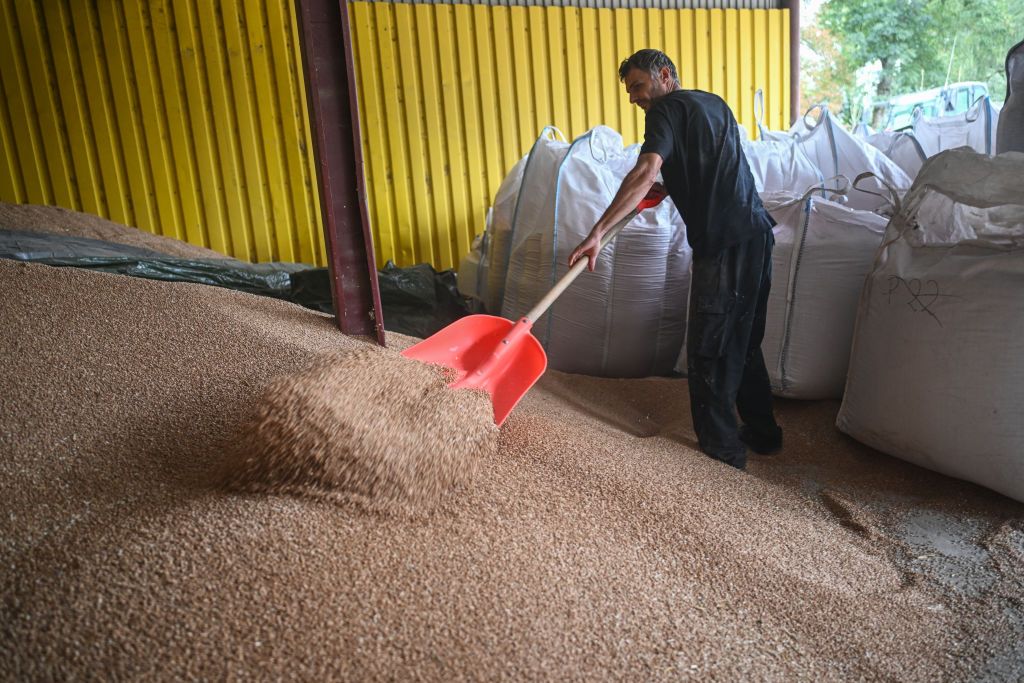
Law and Justice (PiS)
Polls – 30-35%
The ruling party continues to enjoy broad-based support, and many polls suggest it will re-emerge as the largest single force in Poland's parliament.
While Polish President Andrzej Duda and Prime Minister Mateusz Morawiecki hails from Law and Justice, the party's leader and the Polish right's de-facto dominant figure is the Deputy Prime Minister Jaroslaw Kaczynski, a veteran politician who co-founded the party with his brother in 2001.
Law and Justice's popularity stems partly from its generous social spending policies.
Party leaders have blamed previous centrist administrations for neglecting poorer Poles "left behind" by the country's transformation to a market economy in the 1990s.
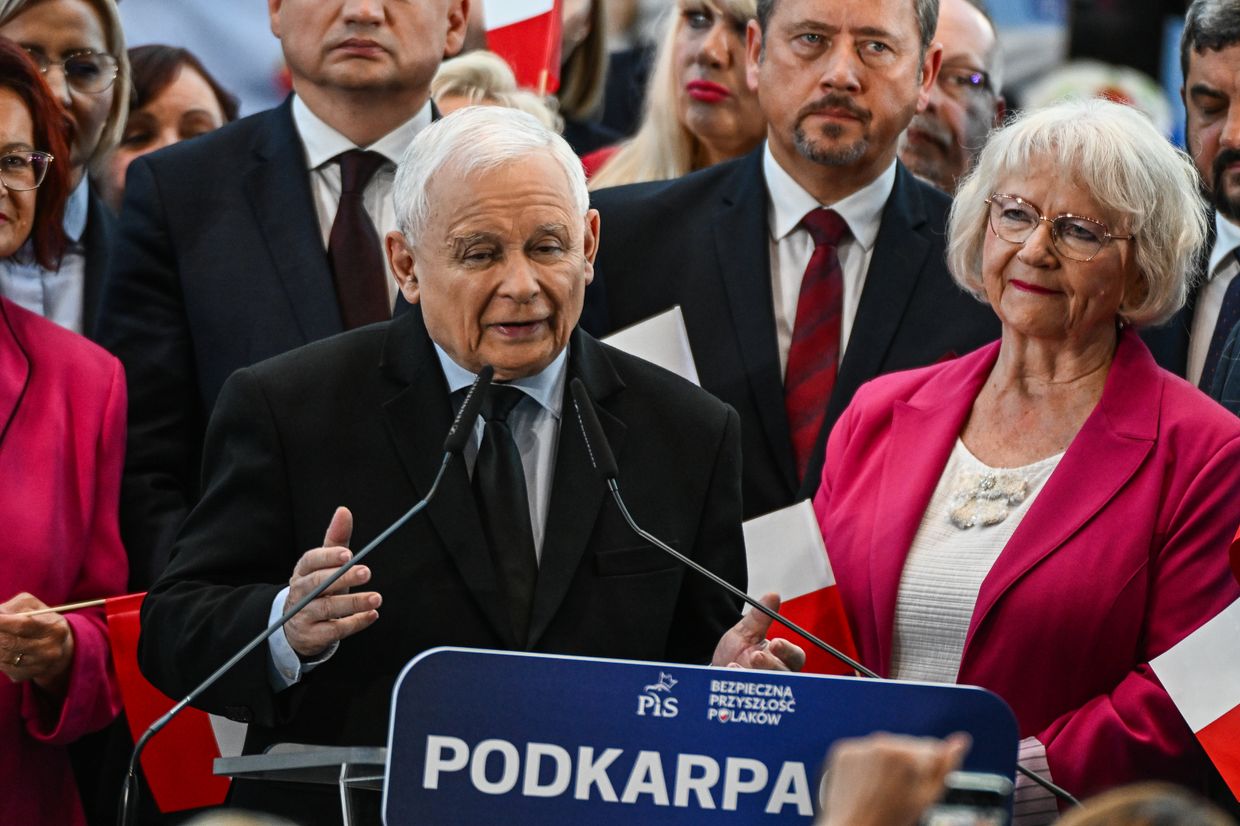
Campaign messaging also highlights Law and Justice's attachment to Catholicism and what it calls traditional Polish values. It has been praised by church leaders for policies which have otherwise divided society, such as bringing in a near-total abortion ban from early 2021.
The government was an early proponent of a Western coalition offering military and political support to Ukraine, repeatedly called last year for Kyiv's inclusion in NATO and the EU, and has vowed to modernize the army.
Like most Polish politicians, Law and Justice figures voice deep distrust of Russia, invoking 40 years of Soviet-backed Communist rule to argue that Moscow remains a threat to Polish sovereignty.
Polish authorities have, however, long been in conflict with Brussels over judicial reforms that critics say have undermined the rule of law.
Law and Justice's latest campaign has sought to exploit anti-EU feelings, casting the bloc – and specifically Germany, Europe's largest economy – as attempting to meddle in Polish affairs.
This has increasingly tipped over into anti-Ukrainian rhetoric, with the party portraying Kyiv as allied with Berlin and Brussels over the fiercely disputed Ukrainian grain imports into the EU.
Tensions ran high in recent weeks as senior Law and Justice figures threatened to block Ukraine's possible membership in the bloc, citing the row over grain as well as lingering historical grievances.
Prime Minister Morawiecki also threatened Warsaw would stop arms supplies to Ukraine before a government spokesman clarified that pre-agreed deliveries would continue. Kyiv is now in talks with Poland and two other EU states, Hungary and Slovakia, over the grain issue.
Civic Coalition (KO)
Polls – 26-30%
Led by former Polish Prime Minister Donald Tusk, who recently led the European Council, the liberal-centrist Civic Coalition is hot on Law and Justice's heels, and some polls predict it may yet garner the most votes on Sunday.
Civic Coalition's core campaign promise is reversing what it calls Poland's democratic backsliding under the current government, restoring a fully independent judiciary, and restoring Warsaw's relationship with the EU.
Its other policies include lowering taxes, ending state subsidies for the powerful Catholic Church, liberalizing abortion laws, and legalizing same-sex civil partnerships.
Like Law and Justice, the Civic Coalition sees Russia as an enduring threat to Poland.
Its leaders have backed ongoing military and political support for Kyiv, as well as Ukraine's eventual EU accession. They also blame firms linked to Law and Justice for aggravating the crisis around Ukrainian grain by failing to secure its timely shipments out of Poland.
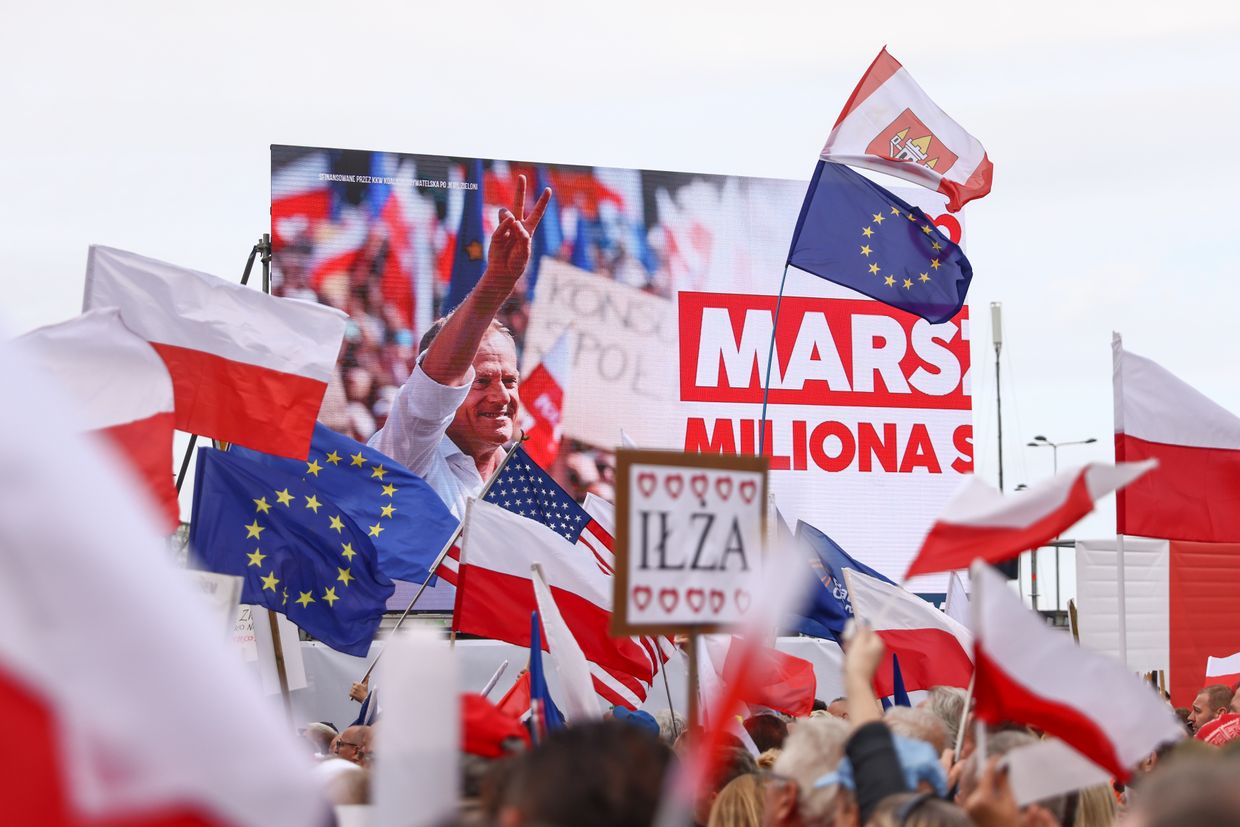
The party promises to revamp transport infrastructure to alleviate the issue, while pledging to continue talks with Kyiv and the EU over grain. It also says it will clarify Ukrainian refugees' eligibility for pensions and benefits in Poland, though it has so far provided no details.
The Civic Coalition has entered into an agreement with two other left-Leaning parties – Third Way and New Left – to field common candidates for the Senate race. The three parties are likely to form a coalition if they collectively gain over 50% of the vote.
Third Way (Trzecia Droga)
Polls – 8-12%
Third Way is composed of the agrarian Polish People's Party (PSL), led by Wladyslaw Kosiniak-Kamysz, and the Poland 2050 movement clustered around former media personality Szymon Holownia.
Despite Hołownia's catholic roots, it backs a clear separation between church and state. It also calls for stronger protections for farmers, including a deposit mechanism for Ukrainian grain imports (whereby importers would pay to bring grain into Poland and be refunded on showing proof of having shipped it out).
Third Way also promises to simplify the tax system, reverse Law and Justice's judicial and media reforms, which it sees as undermining democracy, and raise defense spending.
It has a generally favorable view of the EU and backs ongoing military aid for Kyiv.
New Left (Nowa Lewica)
Polls – 9-11%
Poland's pro-EU New Left alliance, led by Robert Biedron and Wlodzimierz Czarzasty, likewise condemns Law and Justice for its alleged weakening of the rule of law. It calls for a stronger welfare state and the expansion of low-rent state housing programs.
Like the Civic Coalition, it backs legalizing abortion in the first 12 weeks of pregnancy.
It also supports giving all couples (regardless of the partners' sex) the right to marry or enter into a civil partnership and limiting religion's role in public life.
The party has backed continued military aid for Kyiv, but also restrictions on Ukrainian grain imports. It has called for greater EU-wide cooperation on migration but published no specific proposals regarding Ukrainian nationals in Poland.
Confederation, Liberty and Independence (Konfederacja)
Polls – 7-10%
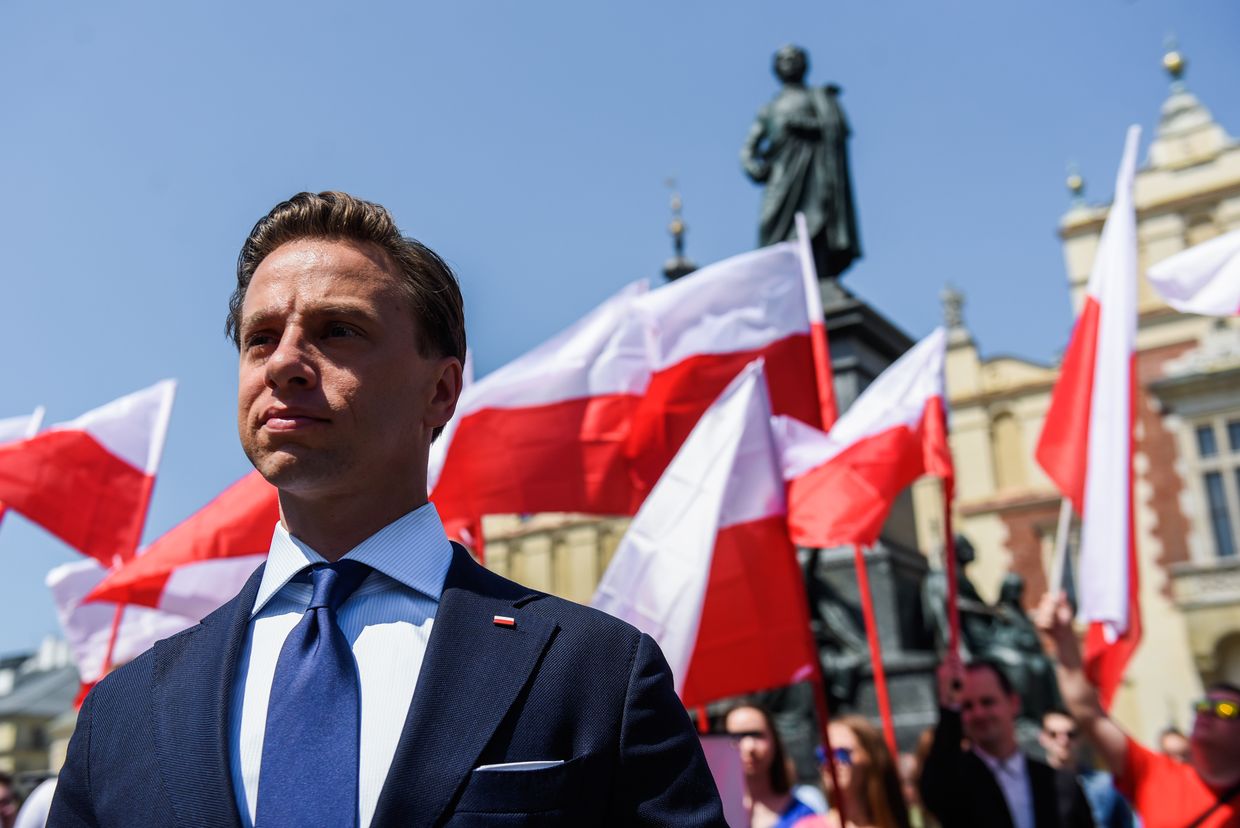
The hard-right, Eurosceptic challenger, its name typically shortened to just Confederation, promises deep tax cuts, deregulation, and a reduction of the welfare state.
The Confederation's electoral base is mainly composed of young men and has recently polled between 7 and 10 percent of the vote. It could hold the balance of power if neither Law and Justice nor a liberal-left opposition alliance can secure a parliamentary majority.
Many of Confederation's members have roots in nationalist movements, and some gained notoriety for their anti-Ukrainian rhetoric, mainly aimed at migrants.
The party has condemned Russia's invasion of Ukraine and is distrustful of Moscow. However, it claims that Warsaw has sent Kyiv too much aid and calls for a wide ban on Ukrainian agricultural produce entering Poland.




